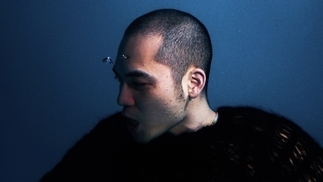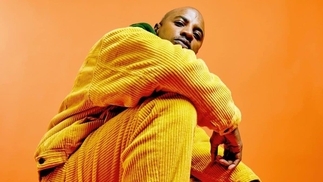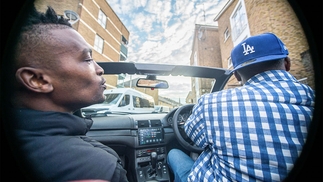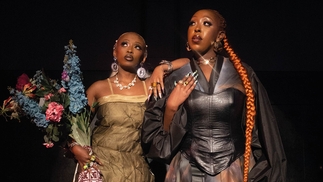On Cue: Themba

South African house DJ and producer Themba has become a global star in recent years. Alongside a mix of thumping and emotive house for the On Cue series, Kristan J Caryl chats to him about his childhood obsession with collecting music, his ambitious 2021 album ‘Modern Africa Volume 1 (Ekhaya)’, and uplifting African artists around him
“Because of our history, we sing and we dance,” says Themba. “It’s our getaway from everything.”
Music has been the renowned South African DJ and producer’s getaway since he was 11, when he started avidly collecting it. Any music: rock, hip-hop, European house, jazz, soul, it didn’t matter. Nor did the format. “Cassettes, CDs, vinyl, whatever medium, whatever music, I collected it,” he enthuses from a restaurant in Johannesburg, before popping another forkful of delicious-looking beef rib into his mouth. As well as enjoying the music, he would devour the sleeve notes as a further means of escape. “I love the discovery of it, reading about who worked on a song — producers, studios and engineers, just building my level of intel.”
Because of the “dynamics of apartheid at that time in 1991”, Themba was the only Black student in his school. “It seemed normal to me then. It was only when I was older that I understood the history of South Africa; understood how different my upbringing was,” he says. “I would be lying if I said I couldn’t sense the tension and racism towards me. It was just different.”
Themba grew up in the townships on the eastern side of Johannesburg. He had proud parents who’d managed to work their way out of poverty. His father had a Ph.D. in industrial psychology and believed academic achievement was the only way out, so he was incredibly strict with Themba when it came to school. The thing is, he didn’t fit in at school. His life in the townships was at odds with his white school peers who came up in the more affluent suburbs. Fortunately, music provided a common link in the playground.
“I wasn’t a huge academic,” Themba remembers, with a warm smile. “And I wasn’t a sporty kid either, but the music was my cool factor. Everyone came to me to ask about what songs I had, and I had everything from my father’s Motown and jazz to the local kwaito to the acid techno all the white kids were listening to.”
Because of his reputation, he was asked to DJ at a small local party aged just 14. Armed with a CD player, vinyl and tape decks, and the Gemini 66 mixer he’d just got for Christmas, he played his first set. “I loved the different reactions to the different types of songs, and realised then that whatever DJing was, that is what I wanted to do.”
Still under pressure from his parents, he kept studying and went on to do financial accounting at Varsity College. At the same time, he managed to hold down his first DJ residency and pay his own tuition fees, but dropped out in the second year. “Then I got kicked out of home,” he laughs. “My dad was like, ‘If you’re not going to go to school, you’re not a child of mine’.” Themba continued to hustle for more and more gigs, and also got a part-time job as A&R of legendary South African label Soul Candi Records.
“Vinyl was being imported from the UK and America, but only in limited copies,” he says. “If you weren’t a super-big DJ, you weren’t getting one, so I started producing my own music and started a ring of upcoming bedroom producers. Together, we managed to move away from relying on those imports.”

Fast forward to 2018, and Themba was shopping his music around as many international labels as he could. At first, no one was interested, so he decided to self-release the deep, emotionally stirring house track ‘Who Is Themba?’ — the title a reference to the fact that whenever he tried to get his music signed back then, people would ask, “Who is Themba?”
The tune hit the Beatport charts, stayed there for 18 months and marked his international breakthrough. After that, he contacted labels such as Knee Deep In Sound, who signed eight of the 10 demos he sent. Now fully established around the world, he has just come back from playing in America, and in summer will return to live in Ibiza once more as he travels Europe and locks down another season-long residency.
The White Isle had a big influence on Themba’s debut album, ‘Modern Africa Volume 1 (Ekhaya)’, which landed in late 2021 on Armada Music. As the title implies, the aim with it was to represent the contemporary sound of South Africa, where Themba says house music is now part of the mainstream. “It was my interpretation of what Fela Kuti and Hugh Masekela would sound like on the same track in 2021,” he explains.
The results are not what you might expect from a now globe-trotting DJ. The album is not a quick cash-in of club-ready, disposable tools, but a richly layered work full of musicality, emotion and beauty. “When you’re chilling out in Ibiza, you’re going to beach bars and listening to downtempo music. I wanted to make music that fits into that, not like a follow-up to ‘Who Is Themba?’” he says. “‘Volume 1’ allowed me to test the waters, it allowed me to see how far I could push the boundaries. We all get stuck in making songs that can rock the dancefloor, but I was interested in making a soundtrack to people’s lives.”
Very much a home listening album, ‘Modern Africa Volume 1’ proudly featured lots of vocalists from South Africa and across the continent. The whole thing was played live for the final recording, and some of the strings were recorded in London’s Abbey Road Studios. “It’s such a far-fetched dream for most South Africans to be able to make and play music for the global audience, so when you do crack it, you want to bring everyone with you.”
South African house icon Black Coffee has a similar mindset, and Themba credits him for helping to break ‘Who Is Themba?’ by playing the early demo. The pair go way back, and used to head to the Winter Music Conference in Miami before either of them had broken through.
These days, Themba, like Black Coffee before him, is on a mission to open doors for as many other African artists as he can. As more acts from South Africa and across the continent see success on a global scale, the number of white European producers imitating African electronic music styles is increasing. Themba is unfazed, however. “I get it,” he says. “Europeans make very functional music, Africans make emotional music, and there’s a middle ground somewhere; but generally, I think the more the merrier. As long as it’s pure and it’s coming from the right place, this music can take you to places that you couldn’t imagine.”
Listen to Themba's On Cue mix, and check the tracklist, below
Tracklist:
Pablo Fierro ‘WUALA’
Hypaphonik feat. Kali Mija, Offkey ‘Lutar (TekniQ Remix)’
Afel Bocoum ‘Alasidi (Everything Counts, Migra (IT) Remix)\
WhoMadeWho 'Silence & Secrets' (Black Coffee Remix)’
Sediis ‘In and Out’
Kususa & Zvri ‘Dangerzone’
Sebjak ‘Vieux (Extended Mix)’ w/ Caiiro ‘You Voice (Acapella)’
DJ Chus, Dorian Craft ‘Breathe (THEMBA Remix)’
ID ‘ID’
Atmos Blaq ‘26 (Atmospheric Mix)’
Whitney Houston ‘Love Will Save The Day’





